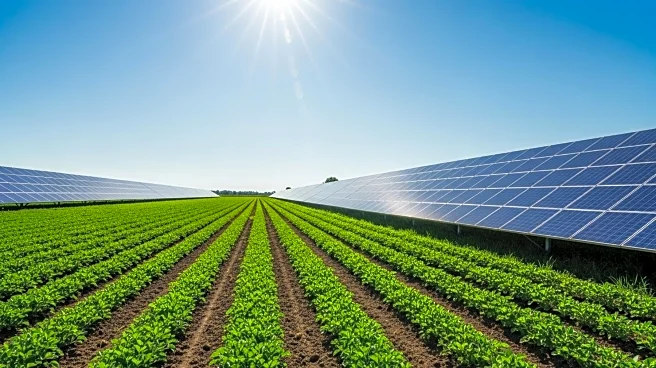What's Happening?
A new agrivoltaic project in Virginia is showcasing the potential of solar energy to support farmers facing economic challenges such as tariffs, inflation, worker shortages, and climate impacts. The Piedmont Environmental Council (PEC) has initiated a pilot project at Roundabout Meadows in Aldie, Virginia, which integrates solar panels with agricultural practices. This project aims to demonstrate that solar energy can be a viable 'energy crop' of the 21st century, providing a lifeline to farmers and local communities. The project involves 42 solar panels installed alongside rows of vegetables, designed to mimic traditional farming setups. The initiative is part of a broader effort to enhance agricultural and food system security, clean energy generation, and battery storage in a state experiencing high energy demands due to data center development.
Why It's Important?
The agrivoltaic project in Virginia is significant as it addresses multiple challenges faced by U.S. farmers, including economic pressures and climate impacts. By integrating solar energy with agriculture, the project offers a sustainable solution that could help reduce bankruptcy rates among farmers. The initiative also highlights the potential for solar energy to contribute to food security and energy independence. As traditional energy crops like corn and soybeans face criticism for their carbon emissions, solar panels offer a cleaner alternative that can be implemented without disrupting existing agricultural practices. This project could serve as a model for other regions, promoting the adoption of agrivoltaics as a means to enhance both agricultural productivity and renewable energy generation.
What's Next?
The Roundabout Meadows project is set to formally launch on October 17, with expectations to demonstrate the coexistence of solar panels and vegetable crops on a small plot of land. The project will collect data to optimize plantings and explore the potential for expanding agrivoltaic practices to urban settings, rooftops, and other built environments. The success of this pilot could lead to broader adoption of agrivoltaics across the U.S., potentially influencing policy decisions and encouraging investment in similar projects. Stakeholders such as Virginia Tech and the National Renewable Energy Laboratory are involved, providing technical assistance and contributing to the growing knowledge base around agrivoltaics.
Beyond the Headlines
The Virginia agrivoltaic project not only addresses immediate economic challenges but also contributes to long-term sustainability goals. By reducing reliance on traditional energy crops, the project supports efforts to lower carbon emissions and promote renewable energy sources. Additionally, the integration of solar panels with agriculture could enhance biodiversity and soil conservation, offering environmental benefits beyond energy generation. As the project progresses, it may influence cultural perceptions of farming and energy production, encouraging a shift towards more sustainable practices that balance food production with clean energy generation.









